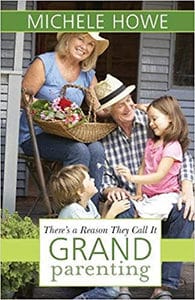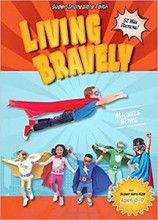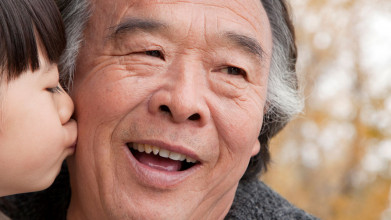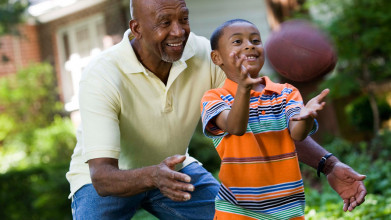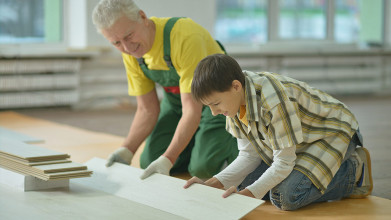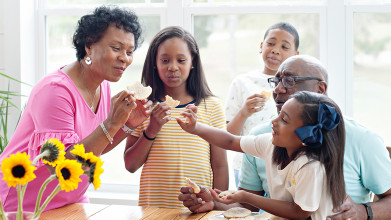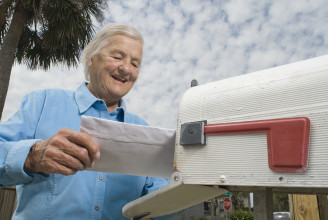Opening:
Teaser:
Man #1: The best thing about being a grandparent is really, you know, we joke about it, but…I can give them back.
Man #2: It’s so much easier to focus on the fun. Get-togethers do not have to end in like, disciplines or lectures. And probably the reason for that is because we are doing what our grandchildren want to do, and we are not over-orchestrating everything.
Woman: The best part about being a grandma is seeing my granddaughter be baptized in a river at her church and just seeing that faith being passed down from my son to his children. It’s just an amazing blessing.
End of Teaser
John Fuller: You can hear the laughter, the joy, and the pride in those grandparents as they talk about their kids and that special season of life. This is Focus on the Family your host is Focus President and author Jim Daly, and I’m John Fuller.
Jim Daly: Grandparents Day is coming up on Sunday, and we want to honor our grandparents! It’s one of the things I hear from so many when I am on the road. They’ll say, “what do you have for grandparents.” Well, folks this is your day. Grandparents can be suck valuable resources to families, and quite honestly, they can also be taken for granted. I know that has happened to so many of my friends. Here at Focus on the Family, we work to provide the support your family needs, and of course we include grandparenting in that task!
Maybe your children and their families live far away and you don’t know how to engage with them. Or maybe you just don’t know what part you can play to support your grandkids, either from a distance or close by.
Today, we want to equip you with some of the tools you need and empower you to strengthen your relationships with your family.
John: As a grandparent you have tremendous influence and our guest, Michele Howe, is going to kinda help you unleash that in a really positive way. Michele is a grandmother herself and author of nearly twenty books including There’s a Reason They Call It GRANDparenting. And Michele was with us once before to talk about being an empty nester, and we’re excited to have her back today.
Body:
Jim: Michele, thank you for being here before, and welcome back.
Michele Howe: It’s so good to be here.
Jim: Let’s get into it. How do you make the distinction between grandparenting and GRANDparenting?
Michele: There is a huge distinction in that the – the grand-parenting differs between being a mere grandparent as somebody who, you know, dips into your grandchild’s life often on. You know, they show up for the occasion, a Little League game when the weather’s perfectly, you know, wonderful outside, or they come for birthdays or holidays.
Jim: So when it suits them.
Michele: When it suits them – that’s a grandparent. But to be a grandparent, the kind the Lord wants us to be, is somebody who realizes that everything we do, every choice we make, every word we say has a spiritual repercussion out there for everybody.
Jim: No, I like that.
Michele: And so you are intent on making sure your grandchildren see who Jesus is early on.
Jim: Yeah. You know, the mantle or the label of grandparent applies to anybody that has offspring. I mean, that’s a very clinical way of looking at it, right? Your kids – your adult kids – have children. Now you’re a grandparent.
Michele: Right.
Jim: But you say in the book, not everyone can be a grandparent. What – what did you mean by that?
Michele: Well, I don’t think everyone wants the load of responsibility. I mean, when I look at my grandchildren, I think – I – I remember back to when our four adult children were growing up and how much I longed for some help. I longed for just a little break.
Jim: (Laughter) Right.
Michele: I mean – and when I watch our five little ones running around, my heart goes out to our adult children who are parents now. And I think, I wanna help. I wanna lighten the load, and I wanna love on those kids.
Jim: Yeah. In fact, you got a piece of advice about that time when your kids were toddlers. What was that advice? Let’s share it with a few million people.
Michele: Well, when you have small kids, you have a hard time.
Jim: Really? (Laughter).
Michele: In a lot of ways. But for mothers who are home with their children, it’s chaos, usually, all day long.
Jim: All day.
Michele: When do you do a quiet time?
Jim: Yeah.
Michele: You usually have a real struggle. And I remember starting to feel bad about it. Like, Lord, there’s no time for you. And one older, seasoned, grandmotherly type woman said, “Listen; go to that verse in 1 Thessalonians 5 where it says breathing in and out – you know, pray continually.” So you get some verses. You put them in obvious places around your kitchen, your bathroom, whatever. You walk by. You breathe it in. You pray it out for somebody. And I love that. And I even think…
Jim: ‘Cause that’s all you can do.
Michele: That’s all you can do because moms are up in the middle of the night; they’re up tending their children all through the day. I mean, it is a 24-hour job. So applying that into the grandparenting realm, you’re not only doing it when your children are little; you’re doing it when you’re grandkids are growing up. I think all the time about my grandkids when I see pictures on our walls. And I pray for them, you know?
Jim: Yeah.
Michele: And I think it’s something you have to do as grandparents. We live in a volatile, dangerous, broken world that’s so aggressive against believing in God and Jesus now that our kids need all the help they can get in the spiritual front…
Jim: Kind of that spiritual cover.
Michele: …To protect them.
Jim: Yeah.
Michele: Yeah.
Jim: Well, and the other thing is, as grandparents, typically, you have a little more time now. You can breathe. And you can pray, and you can be very specific and spend time doing it – reading the word…
Michele: Right.
Jim: …And praying blessings and protection over your grandkids, which I think is great. Let’s look at it from the perspective of the grandchild. How do they benefit from being over at grandma and grandpa’s house?
Michele: Well, I always think…
Jim: Other than ice cream.
Michele: Other than ice cream and…
Jim: And sweets they shouldn’t be eating (laughter).
Michele: Right, and all those great things you can – you can spoil them with. You know, I think a lot of grandparents get hung up on, we have a tight budget. Our house is small. The kids are too loud. You know, and they resist the opportunity of being hospitable to their grandkids, whereas, really, all you have to do is love them when they walk in. You know, what do – what do you – when you walk into a guest’s home, they, you know – you feel what they’re feeling. And if you feel loved and accepted…
Jim: Sure.
Michele: …That’s all that matters. And I think that’s what I want. My kids walk in – my – with their grandkids. I want the kids to run up to me and say, “Grandma,” not because I need it, but because I know that they are cherished. They know they’re cherished, and it’s just a beautiful, you know, scenario.
Jim: You know, one of the things I remember very distinctly with Trent and Troy is when we went to Jean’s parents’ house early on. I mean, they were cognitive and operational at that point – three or four years old, where we could watch them react. They felt so comfortable there, which caught our attention because we’d go to friends’ houses and, you know, they’d be a little intimidated or a little shy. But when they stepped into Jean’s parents’ house, it was like they were there with family. Like, they knew it.
Michele: Right.
Jim: There was something different. Does that happen?
Michele: Oh, it does happen, and it can happen all the time if you’re the grandparent who makes it happen.
Jim: Yeah.
Michele: You know, and I know some grandparents who – you know, the grandkids run in, and they’re – already, the expectation is high. Why isn’t my grandchild running up to me and giving a big hug? Well, because he’s at that age where he doesn’t like anybody.
Jim: Right.
Michele: You know what I mean? But their self-esteem is so involved in that love and that adoration from their grandchild that they are just – they’re not loving…
Jim: Yeah.
Michele: …Their grandchild unconditionally. They’re the adult. They should be the mature one. They need to be unconditionally accepting their grandchild – all of them – despite if they don’t care for their personality or the little season their kid is in or whatever. We’re called to love them and to be, like you said, that covering and – and just the, um – the parent – the grandparents who buoy them up amidst…
Jim: Yeah.
Michele: …Amidst all the – the heartache.
Jim: Michele, let’s camp there for a minute because I think it could be very instructive for those listening who are in this spot right now, either as the grandparent or maybe the adult child. But so often, personality plays a role in this as a grandparent. You might’ve been a more introverted person as a grandparent. And it’s hard for you to be up and buoyant and, you know, to be thinking of that grandchild because they’re not really contributing to the discussion of world peace yet, you know. So it – it takes from you.
Michele: Right.
Jim: What advice would you have for that type – that personality type that, you know, may be a little distant as a grandparent? How do they break out of those shackles and understand what their – and understand what their grandchild needs from them?
Michele: Well, one thing I think that grandparents neglect to do is talk to the parents. If you…
Jim: (Laughter) Yeah, that’s true.
Michele: …Are at a loss…
Jim: They wanna talk right over them.
Michele: Right. If you’re at a loss and I’m not sure what one of my grandsons or my little granddaughters like or if they’re in a kind of a weird stage, I go to my daughters and say, “OK, they’re acting a little funky weird right now. What are – what – what’s going on? Help me.”
Jim: But you’re proactive about it…
Michele: Yes.
Jim: …As the grandma.
Michele: And I think you have to be proactive. And I’m an introvert.
Jim: OK.
Michele: So if I’m an introvert and I’m doing it, any other introvert out there can do it.
Jim: No, that’s good to know.
Michele: You know, and my husband’s an extrovert, so they run up to him, and they’re in his arms.
Jim: Right.
Michele: Papa – and they’re all over him. And, you know, and while that can be a little bit much for me when they come into the house and give me their hugs and I direct them to the next thing we’ve planned or whatever, it’s all great. But, you know, you have to communicate to the parents.
Jim: Yeah.
Michele: I mean, you’re not just these adults in their life that can make independent decisions for your grandchildren. You have to respect your adult children.
Jim: You know, so often, those – those fissures that exist in the grandparent-adult child relationship can get blown up. They become canyons in this relationship, and it could be a whole set of things. You know, it’s the grandparents aren’t following the rules of the parents – their kids – who are setting different rules for their – their kids, right?
Michele: Mmm hmm. Yep.
Jim: How does a – a grandparent honor their adult children? – which they probably have struggled their entire life honoring their kids.
Michele: Mmm hmm. Right. And that’s a good point. I think that, again, communication is key. When your child comes over with the grands, I ask them, “What are they allowed to have today? Can they have a treat?” If she says yes, it’s OK. If she says no, I honor that. Are they allowed to watch anything on television today? I mean, any – any little kid’s program…
Jim: No, that’s good. So you go through a checklist.
Michele: We – in my mind, I, like I know what their standard is in their house. I want to uphold it and applaud it and elevate it so that those grandkids love their moms and dads and respect them. And then we can be that conduit that helps it all work out ’cause there’s gonna be a point where those grandkids are going to start rebelling some, questioning the authorities, you know. I mean, my grandsons have said to me, “Well, Mommy makes me do that. What do you think?”
Jim: Oh, really?
Michele: And – yeah. Yeah. And I’ll say, “Well, I think that is a really good idea because da da da da.”
Jim: Yeah. So you support Mommy.
Michele: Oh, support Mommy. Support Mommy. Support Daddy. And I – if they say, “Well, Mommy was kind of mad” or whatever, I’ll say, “Well, Mommy had a long day. And you know what?”
Jim: That’s good.
Michele: “What do you do when you have” – you’re talking. You’re always trying to get them to be critical thinkers into looking to the Lord. What would God choose? But you know what? You’re right? When there’s those broken relationships with your adult children, you gotta be extra careful.
Jim: Yeah.
Michele: But you’re already extra careful.
Jim: Well, you know, and the point of it is, what a great time to repair those – those relational problems. Better now than later.
Michele: Yeah.
Jim: I mean, why not work on it?
Michele: Right. And when you can do that, when a grand baby comes along – boy, I’ve seen, you know, families kind of mend together because maybe the grandma – the older grandma was upset with her adult son, let’s say. That baby comes in the picture, and then his wife goes, “You know, you – we need to make amends here. We’re not gonna have a babysitter, number one. And number two, you’re not gonna have a relationship.” You know, and the grandma starts to soften.
Jim: Right.
Michele: They work things out. I mean, those babies hold a lot of leverage.
Jim: Yeah. I love that saying that grandparents have a special bond with grandchildren because they share a common enemy (laughter).
Michele: Very good. Yep. Yep. Yeah.
Jim: Let’s not talk about that. But it is kind of funny, especially how many – how many parents have said, “Yeah, when my kids grew up and had children, it was so good to see their – their strong-willed child”…
Michele: Yeah.
Jim: …”My grandchild going after him a little.” It’s a little vengeance, I guess.
Michele: Right.
Jim: Hey, you actually had a moment in the car similar to what we’re talking about with a grandson. I think two of your grandsons were in the car, and they were kind of doing some stuff that freaked you out. What happened, and how did you manage it?
Michele: Well, my oldest daughter and her husband were on a job search across the state with their infant son. We had the two other boys at our house for three days or so. And I was wiped out – I mean, wiped out. I don’t sleep well. I mean, I was done ’cause I’m older. And I’m done. You know, I’m not…
Jim: (Laughter) That’s a problem.
Michele: I’m not, like, a young mom. So I’m – I’m driving them home, and it was going fine. And I was mentally thinking, “Wow, we had a really great three days.” No fighting – it was just bliss. And all of a sudden, I hear this bloodcurdling scream – “Ma, he poked my eye out.” And I mean, it was so loud and so piercing that I went (gasping), you know? Almost went off the road…
Jim: Jerked the car wheel.
Michele: Jerked the car. I – I stop the car. I get out. I – fully expecting to see some eyeball – not right. And then I look back, and then I talk to them and say, “You cannot scream in the car. You cannot do that. Grandma will go on the ditch. We’ll be in real trouble then.”
Jim: A little bit of guilt (laughter).
Michele: Yeah, a little bit of guilt. But I get back in the car. The same thing happened.
Jim: Oh, my.
Michele: And that time, I did it twice. And the next time, I was probably sterner ’cause Grandma was running out of patience. And, you know, they – they quieted down. Now, I didn’t yell at them, but I was stern. We get them to their house. I’m unpacking, you know? And the one little guy – he’s looking at me, and he’s, like – big eyes. And I said, “What’s wrong, honey?” And then I realized I’d never been stern with them before.
Jim: His first time he had seen it.
Michele: Yes, he’d – first time he’d seen it – shook him up. And then I talked to him, and I said, “You know, I’m really sorry I had to be stern with you,” but went over it again, got him out of his car seat, gave him a hug and a kiss. We were fine. But at that moment, I realized, as Paul Tripp says in more words, “Every word is a word from God.”
Jim: Yeah.
Michele: And they’re responsible. So either we’re gonna build people up, or we’re gonna tear them down.
Jim: Mmm hmm.
Michele: You know, and I thought that applies in grand parenting. You can’t be, you know, critical and negative and a lot of the things that, you know, moms and dads struggle with day to day with their kids ’cause they see misbehavior.
Jim: Yes.
Michele: But, boy, with your grandkids, there’s a whole different ballgame. And you really have to be careful because their little hearts – they look at you as Grandma or Grandpa and think, “They love me,” you know – unconditional love. And if you have to do that, do it the right way.
Jim: Yeah. It’s a great point when you think the spiritual dimension of that because grandparents so often represent love – the love of God. I mean, they – and unconditional…
Michele: Right.
Jim: …Even more so than the parents ’cause the parents have to lay down the rules, reinforce the rules.
Michele: Sure.
Jim: So they’re about truth (laughter).
Michele: Yep.
Jim: “What’s the truth about your dirty room?” – where grandparents tend to concentrate on loving that child, which is beautiful. I mean, ironically, it’s probably how God thought it would turn out, right?
Michele: Right.
Jim: But in that regard, um, you know, not – grandparents aren’t always in a position to be loving and kind, and that – that creates its own kind of unique dynamic. I know for Jean’s mom and dad – of course, they’re not Christian. They weren’t Christian before they passed away, to the best of our knowledge. And in that regard, they had some pretty definite ideas. We don’t watch the kids overnight. You know, she had a nice toy box for them and her other grandkids when they came over. It was special that way, and they enjoyed that interaction. And she was playful with them and those things, but only for a couple hours.
Michele: Right.
Jim: You know, this is the extent of what I can do. And it wasn’t really necessarily that declared, but it was – it was known. And what advice do you have for adult children with grandparents that – they want a bit of the kids, but they don’t want a lot of the kids?
Michele: Mmm hmm. And that’s common.
Jim: Yeah.
Michele: I mean, it really is. And I think we have to realize and accept that every grandparent may not even be excited to be a grandparent.
Jim: Right.
Michele: I mean, especially from our culture – I mean, a lot of people think now, “I raised my kids. I am not babysitting anybody else’s kids” – even their own grandchildren, which is super sad.
Jim: Right. This is my time.
Michele: This is my time.
Jim: (Laughter) My free time.
Michele: It is.
Jim: And I get that.
Michele: Yeah.
Jim: But, you know, they’re missing out on a blessing.
Michele: They’re – absolutely.
Jim: How do they manage that emotionally as the parents – the adult children of these parents?
Michele: It’s tricky. I mean, you know, I have parents who babysat our kids, and my mother-in-law babysat our kids. You know, they both were working full time, so it wasn’t a lot, but they were always happy to see our kids. I mean, and you knew it. But then I have friends who – her mom never babysat her kids at all and didn’t want any part of them.
Jim: Right.
Michele: And I saw my friend wrestle just with – almost being bitter.
Jim: Well, I would think that the problem is you build up expectations.
Michele: Mmm hmm.
Jim: And I would start with, maybe, the advice being, don’t have very high expectations in that relationship – that they can do more than what they’re willing to deliver.
Michele: Right.
Jim: Right?
Michele: Well, in media, what do you see in commercials? Grandparents with their grandkids.
Jim: Doting and loving.
Michele: Doting and loving. I mean, it – the world tells us, when you have children, the grandparents are gonna be there and have a significant role in their life. And if you don’t live up to that, you know what? You probably already, like you said, may be sort of estranged with your adult children or with – you know, it depends on which way it’s going – all that tension. Exactly what you said is right. Expectations have to be managed.
Jim: Yeah.
Michele: And you have to let them go.
Jim: Right.
Michele: And you have to work on gratefulness and thankfulness for what they will do.
John: You’re listening to Michele Howe on today’s episode of Focus on the Family today. And she’s written a terrific book titled There’s a Reason They Call It GRANDparenting. It will encourage you to get your copy at focusonthefamily.com/broadcast or when you call 800 – the letter “A” and the word FAMILY.
Jim: Michele, your daughter and her family moved away, I think, a couple of years ago. Um, this is another problem where you’ve had them nearby, and that love and that bond is created. And then there’s a job promotion, and they gotta move a couple of states away.
Michele: Yeah.
Jim: How did you manage that? And what are some recommendations you have for grandparents that are in that spot – maybe even to worsen the scenario – where they have moved from their location to be with their adult children and their grandchildren, and then they decide they’ve gotta move?
Jim: And then you’re stuck in this city you have only a few friends in.
Michele: Right. And that is common.
Jim: It is common.
Michele: It is very common. I know – two and a half years ago, my daughter, who always told me, “We will never move away, Mom”…
Jim: (Laughter).
Michele: …”Because family is too important.”
Jim: Right.
Michele: My oldest daughter – never. So I had that always in my head that her, her husband and our three grandsons would never be far from us.
Jim: Right.
Michele: And then that day when she told me that, my heart plummeted. And then it took me a few days, first of all, to even digest it. And they moved, uh, four months later after that announcement, and I was semi-depressed.
Jim: Yeah.
Michele: I mean, I cried every day, and I kept thinking it’s like a death, you know? And then I would hear – you know, well-meaning people would say to me, “Well, be thankful they didn’t move out of the country.”
Jim: (Laughter).
Michele: “Well, be thankful they didn’t move across the country.” And I’d be like, “But you’re not getting it. I’m used to seeing them often.”
Jim: Right.
Michele: “We are such a key part of their life, and now we won’t see them hardly at all.” I had to grieve that.
Jim: Right.
Michele: So…
Jim: But in that context – and here’s, I think, the golden question – did you throw that back at your daughter’s face? I mean, how did you manage that emotionally with her when you had a phone call? Did you grieve that with her, or did you restrain from showing your disappointment that family wasn’t as important as she expressed it to you earlier?
Michele: It was both and because we – they lived close enough that we saw them enough. So there weren’t really many phone calls. They were in – in-person conversations. But, you know, she moved so her husband could be a pastor of a church. So you can’t argue with that.
Jim: (Laughter) You’re right.
Michele: So it was a great – it was like God opened…
Jim: Yeah.
Michele: …The door for him that he had been wanting. So…
Jim: Well, how – how would you counsel someone that, you know, is feeling that bitterness? How do you suggest they talk about that with their adult children?
Michele: Yeah.
Jim: I thought we were all gonna live here and look what happened. And help me understand and – because some people have a hard time processing that.
Michele: They do.
Jim: And they will have resentment about it, and that’s not a good place and a healthy place to live in Christ.
Michele: You’re right. I think – I think of Linda Dillow, who said, “God is the blessed controller of all things.”
Jim: Yeah.
Michele: And I – I reached for that statement because I knew the Lord didn’t have to give my son-in-law a job out of town. He could’ve given one to him in town. So right then, it started me thinking, “Is – God is the blessed controller, the sustainer of life. He has the big plan.” I don’t know what’s really going on. I had to trust him. So I had to thrust myself under the sovereignty of God, you know, and – and just read Scriptures and keep telling myself that as hard as this is gonna be, I was gonna find the good in it.
Jim: Yes.
Michele: I was determined to find the good in it and not become or just stay depressed. I mean, you can grieve and feel depressed for a while, but you can’t unpack there.
Jim: Right. And that is a good example.
And, too, Michele, in our culture today, there’s so much family fragmentation. So children – grandchildren are facing issues of divorce, separation, having a stepparent…
Michele: Right.
Jim: …Those kinds of things. What advice do you have for those grandparents in that situation where, really, the family – the biological family has been lost, even within the Christian context? I mean, this is happening in our churches, as well.
Michele: Right.
Jim: So what can a grandparent do to be there for that grandchild who’s really, uh, suffering?
Michele: Well, I – I suggest, first, you pray because I think a lot of times, grandparents’ first response is to run right in and fix it and try to solve it.
Jim: That one, you can’t fix, typically…
Michele: You can’t.
Jim: …From a grand parenting position.
Michele: You can’t. And I know even in the small group I’m in, I mean, we have – what? – eight or nine women, and three of them have heroin-addicted adult children. So they’ve taken on the role of parenting their grandchildren.
Jim: Far more common.
Michele: It’s happening more and more and more – so not only divorce, but just adult addicts – or just, they’re not stable enough to be grandparents – or parents. So what do they do? They do what they can, one day at a time. They rely on the Lord. They, you know – they just get other people to help them. But it’s tragic, and they find out that their retirement years are not at all turning out like they expected.
Jim: Yes.
Michele: It’s very tragic and very challenging.
Jim: Yeah, it is. And it puts an incredible load on the grandparents in that way. And I’m grateful that grandparents step up, and they’re doing all they can do. Uh, you mention in your book, um, a handful of ways – handful of steps, I guess – to become a grandparent. Uh, what are those steps?
Michele: Well, first of all, I think you have to always think in spiritual terms.
Jim: That’s a good thing.
Michele: That – yes.
Jim: Yes, that’s it.
Michele: That everything – everything is all about getting your kid, your grandchild, your adult children to know the Lord Jesus Christ as savior and as Lord as early as possible. I mean…
Jim: So everything you do should point that direction.
Michele: Everything.
Jim: In a playful way…
Michele: Everything.
Jim: …In a serious way…
Michele: Yes.
Jim: …Conversational way…
Michele: Yes.
Jim: …Every way.
Michele: Yes, everything needs…
Jim: I like that.
Michele: Everything has to – because that’s the only thing that’s going to last.
Jim: Right.
Michele: But really, it’s got to be the orientation of your heart to want to be a significant role in your grandchild’s spiritual development.
Michele: That’s the first thing. And the second thing is love them unconditionally. You may not like your grandchildren sometime. You may not like them. But you know what? You’re going to love them. You’re going to look for the best in them.
Jim: And typically, there is a special bond there.
Michele: Mmm hmm.
Jim: So loving your grandchild, I think, comes a little – maybe a little easier…
Michele: It does.
Jim: …Than parenting that child…
Michele: Absolutely.
Jim: …’Cause of all the responsibility.
Michele: Right. But, you know, sometimes I hear grandparents say, “I just don’t know what to do with that kid. I just don’t know what to do with that kid.” And I’ll say, “Well” – and then we’ll look. We’ll say…
Jim: Yeah.
Michele: “…Well, give me – give me some positive things.” Those are the two biggies. And then insert yourself into their life in a significant way.
Jim: You say make time and space for your grandchild.
Michele: Make time and space. And you know what?
Jim: I like that.
Michele: You have to clear your calendar. We’re all busy. No matter what age we’re at, we’re busy. And there’s plenty of things we can do every day. But if you’re playing golf three times a week, and you won’t watch your grandchildren, that’s a problem.
Jim: Right.
Michele: It really is a problem.
Jim: Oh, doggone it (laughter).
Michele: Yeah. You need to (laughter) – you need to get them into your life. If you don’t spend time with them, you can’t influence them.
Jim: Yeah.
Jim: Well, and so often we use this term ministry of presence. But man, in grand parenting, it’s all about presence, right?
Michele: Absolutely.
Jim: Being there for ’em, having that hug, that kiss, that little affection, sharing cookies together…
Michele: Right.
Jim: I mean, all that is good stuff.
Michele: Oh, it’s all good stuff.
Jim: And that’s what those grandkids will remember when they’re adults.
Michele: Yep. It’s all the dailies of life.
Jim: Yeah.
Michele: It really is – the cooking, the baking, the mowing the lawn, the working in the garden, the fixing a tire.
Jim: Yeah.
Michele: It’s just taking them along with you and saying, “Come on. Help Grandma. Help Grandpa.”
Jim: Yeah – so good. The fourth was respect the parents. We kinda covered that.
Michele: Mmm hmm.
Jim: Respect the parents’ rules.
Michele: Yeah.
Jim: And we’ve touched on that. Uh, one thing you say that is so important for being a grandparent is not protecting your grandkids from suffering. That seems so counter-intuitive because there’s always that desire to bail out, to help, to step in. Why is it important to allow your grandchildren to suffer reasonably?
Michele: Yeah. We wanna teach people to suffer well. We wanna suffer well. And what does that mean? It means realizing suffering is going to be a key factor in all of our lives. It’s, um…
Jim: Well, it teaches you what? Character.
Michele: It teaches you character. People do not grow strong in the high times of life.
Jim: That’s exactly right.
Michele: We grow when we are hurting, when our back is against the wall, when we’ve failed ourselves and others. We need to be able to talk on the child’s level, not down to them, but with them and say, “Grandma felt just like that.” And then give the instance. “And this is what I did. And I know you hurt. And I know it’s hard.” And give ’em a hug and love on them. But help them to see that there’s a bigger story.
Jim: Yeah.
Michele: Yeah.
Jim: Boy, that is so good. Michele – fantastic all the way around. I hope grandparents are leaning in, listening. And I hope you’ll get a copy of Michele’s great book, There’s A Reason They Call It GRANDparenting. (Laughter) I love saying that. But it’s filled with helpful advice on how to be engaged, how to be a spiritual mentor to your grandchildren while respecting your adult kids. That’s the trick. And, uh, we want to get this resource into your hands. Michele, thanks again for being with us.
Michele: Thank you for having me. It was a real pleasure.
Closing:
John: This has been really great, and I hope we’ve helped you as a grandparent to feel a little more empowered as be a positive influence in your family.And that you’ll join our support team here at Focus on the Family. Many people across the country and the world need a touch from God, whether it’s to deepen their faith or to get help for a particular situation.
And Focus on the Family is here for those folks. So when you do your ministry through Focus with your prayer and financial support—you’re allowing us to provide the kind of answers that people need.
In fact, when you donate today—a gift of any amount on a monthly basis or one time gift and we’ll send you a copy of Michele’s book There’s a Reason They Call It GRANDparenting it’s our way of saying thank you for joining the support team and allowing us to reach out even more effectively in ministry.
Toget in touch, and todonate and get your copy of There’s a Reason They Call It GRANDparenting,just call 800 – the letter “A” and the word FAMILY or stop by focusonthefamily.com/broadcast.
Well, Have a great weekend—and a special Grandparent’s Day!, if you’re fortunate with some grandkids in your life. And then be sure to join us again on Monday as you’ll hear the story of one mom who uprooting her family from a comfortable, midwestern life to go plant a church in a very rough inner-city setting!
Teaser:
Shauna Pilgreen: And we’re learning day by day – and it’s hard – but that what we get to see and who we get to pray for and who we get to do life with surpasses any comfort that we’ve ever had.
End of Teaser










